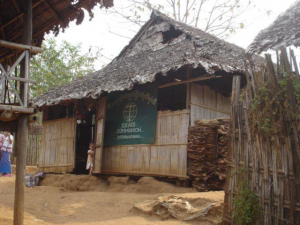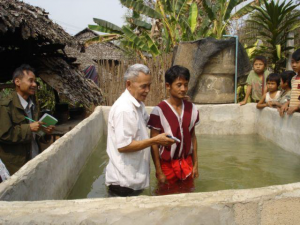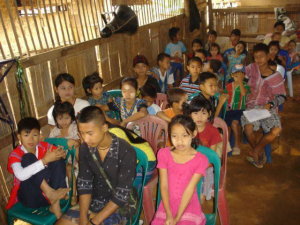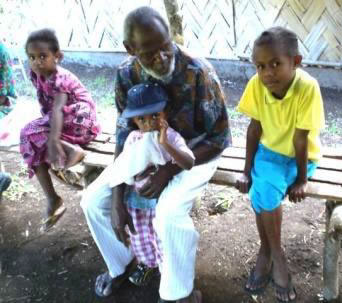The following report is from Rod Matthews, GCI mission developer in SE Asia, New Zealand and the Pacific Islands.
Thailand
 In Thailand we have a congregation made up of Karen refugees from Myanmar. It is probably one of the most isolated of our congregations – not because of physical distance from others but because of their unfortunate circumstances.
In Thailand we have a congregation made up of Karen refugees from Myanmar. It is probably one of the most isolated of our congregations – not because of physical distance from others but because of their unfortunate circumstances.
This congregation has about 50 in attendance, more than half being children. They are in one of five camps along the Thai-Myanmar border which together hold more than 100,000 Karen refugees. Most have fled the fighting with the Burmese army over the last few decades. Most have nothing to return to, even if it was safe. Many of the villages back across the border in Myanmar have been burnt down and/or repopulated. So most of these people are essentially stateless and cannot move freely within Thailand. The children know of no other way of life but living in makeshift homes of wood, bamboo and thatch, in a vast town where (in this case) 40,000 people exist in cramped conditions with dirt lanes -either dusty or muddy – lining the hills for kilometers along the road that follows the border in the picturesque country north of the town of Maesot.
 Yet we are privileged to serve the congregation that God has given us there to look after. On February 12, South East Asian pastoral coordinator from Malaysia, Wong Mein Kong and I were able to visit the congregation in the camp for services. It has been two years since we had gained approval to enter the camp.
Yet we are privileged to serve the congregation that God has given us there to look after. On February 12, South East Asian pastoral coordinator from Malaysia, Wong Mein Kong and I were able to visit the congregation in the camp for services. It has been two years since we had gained approval to enter the camp.
Upon arrival we were amazed to see the large (and permanent) baptism pool the church members had built in preparation for four pending baptisms. The church service was planned around the baptisms – three people from member families, and one new member. Wong Mein Kong spoke on the significance and meaning of baptism (with local pastor, Lah Shi, translating into the Karen language).
After the baptisms, the celebration of this wonderful event included a communion service, and before we all took the bread and wine, I explained its significance and the joy of partaking together the elements that recognize Christ’s life-giving work to reconcile us to our Triune God and his Body of which we are now a treasured part.
 Several more member families have been granted UN approval for resettlement overseas in the months ahead after the paperwork and medical exams have been completed. But although the numbers regularly attending our congregation have declined in the past few years for this reason, others have started attending. This day there were over 40 children in attendance.
Several more member families have been granted UN approval for resettlement overseas in the months ahead after the paperwork and medical exams have been completed. But although the numbers regularly attending our congregation have declined in the past few years for this reason, others have started attending. This day there were over 40 children in attendance.
As I meet with congregations like this one, I am moved to note that none of us chose our nationality or place of birth, and in their case, their very difficult circumstances. We pray more earnestly “Thy kingdom come” as well as hoping that the day will soon be here when these refugee camps will no longer be needed. Only God knows how many millions around the world live in such distressing circumstances as a result of man’s inhumanity to man.
Vanuatu
 On November 6 last year, Obed Slee, the eldest of our members in the Pacific Island nation of Vanuatu, died, possibly of a heart attack. His age was not known but he was probably in his mid 80’s since he had mentioned that he was a teenager when the Americans were in the country (then called the New Hebrides) during World War II. More intriguing, however, is that Obed (pictured with his grandchildren) had confessed that his grandfather had been a cannibal. Rex Morgan, pastoral supervisor for Vanuatu, recalls Obed once telling him this, so perhaps he was one of last surviving adults who have heard accounts firsthand from a relative who practiced cannibalism. (The last recorded incident of cannibalism occurred in 1969 on the island of Malekula where our church is located).
On November 6 last year, Obed Slee, the eldest of our members in the Pacific Island nation of Vanuatu, died, possibly of a heart attack. His age was not known but he was probably in his mid 80’s since he had mentioned that he was a teenager when the Americans were in the country (then called the New Hebrides) during World War II. More intriguing, however, is that Obed (pictured with his grandchildren) had confessed that his grandfather had been a cannibal. Rex Morgan, pastoral supervisor for Vanuatu, recalls Obed once telling him this, so perhaps he was one of last surviving adults who have heard accounts firsthand from a relative who practiced cannibalism. (The last recorded incident of cannibalism occurred in 1969 on the island of Malekula where our church is located).



Thank you Mr. Mathews for encouraging words, even as you give us information on the present distress of many of our brothers and sisters in Christ.